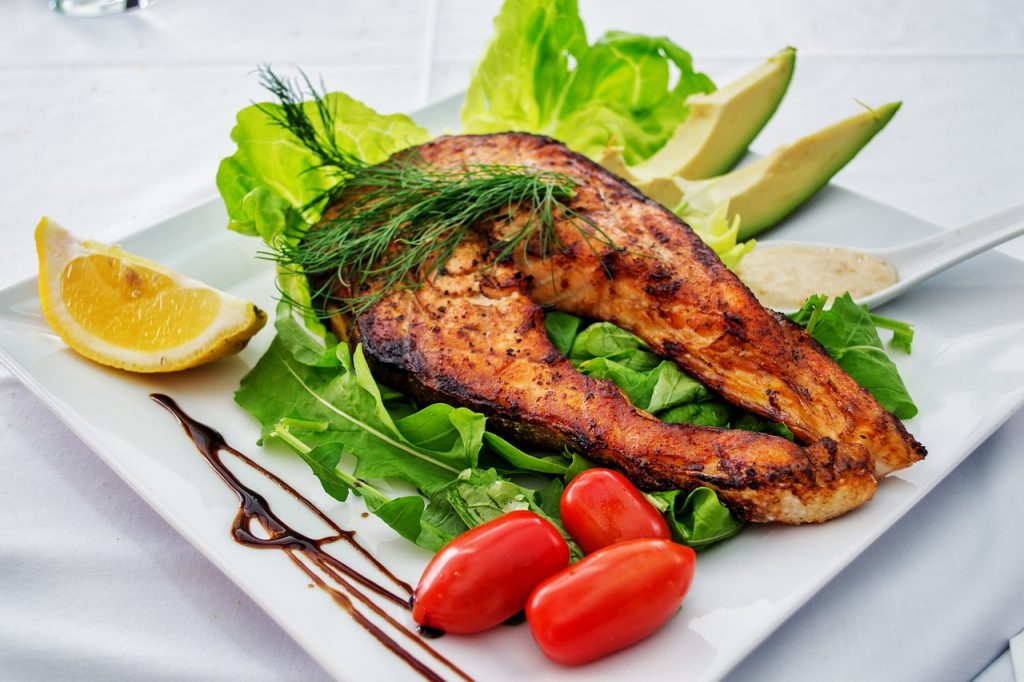
Do you love salmon but have gout and are wondering whether or not to keep it in your diet? In this article you’re going to discover exactly that; the pros and cons of having salmon in your gout diet.
Salmon and Gout
Salmon is mostly found in the Atlantic and Pacific oceans as well as inland lakes in North America and Northern Europe. The most commercially fished types are Atlantic, King (Chinook), Chum (Keta), Coho (Silver), Pink (Humpback), and Sockeye (Red).
Salmon (along with tuna) is in the top 3 most frequently consumed seafoods lists in the U.S., U.K., and Australia. So it’s extremely popular. And no wonder, apart from it’s beautiful flavor, it’s jam-packed full of healthy nutrients making it one of the healthiest foods on the planet…
Health Benefits of Salmon
All types of salmon are rich in:
- omega-3 fatty acid (essential fatty acid)
- protein
- B vitamins (1, 2, 3, 5, 6, 9 and 12)
- vitamin D
- selenium
It’s also a good source of:
- potassium
- astaxanthin (antioxidant)
- iodine
- choline
The outcome is that several studies suggest that a regular diet of wild salmon can help to lower the risk of:
- some cancers (e.g. leukemia, colorectal, prostate, breast).
- heart disease and heart attack.
- stroke.
- high blood pressure.
- heart arrhythmia.
- macular degeneration.
And help to:
- improve brain function.
- protect joint cartilage.
- stabilize blood sugar.
- lower stress and anxiety.
- improve bone health.
- improve the immune system.
- improve eye health.
- reduce inflammation
- help protect the body’s cells.
You can see that salmon is packed full of vitamins, minerals, and other nutrients that make it one of the healthiest foods out there.
So why wouldn’t you want to eat it regularly as part of a healthy diet?
Well, if you suffer from gout, you have to balance the undoubted health benefits against any risk that salmon could trigger excruciating gout.
So let’s consider that then…
Salmon: Good or Bad for Gout?
The first thing to consider, of course, is salmon’s purine content. Remember, gout is caused by higher than normal levels of serum uric acid out of which crystals of urate accumulate in the joints and surrounding tissue.
But uric acid is a byproduct of the chemical breakdown of purines that exist in our body’s cells and the cells of foods we consume. The higher the purine content of food, the more uric acid is produced. So we need to avoid foods that have the highest purine concentrations.
So how does salmon rate in the purine / uric acid table?
Purine Content of Salmon
Smoked salmon is rated as a “high” purine food: it contains >200 mg uric acid per 3.5 oz (100 g) food serving. So smoked salmon should be excluded from your gout diet.
But although foods with a high purine content should be avoided, foods with a moderate purine content may be consumed..well…in moderation!
Which is great news for us gout sufferers because cooked and canned salmon are rated as being “moderately high” in purines, i.e. containing 100-200 mg uric acid per 3.5 oz (100 g) serving.
So grilled or baked salmon, for example, may be eaten in moderation, which means limiting your intake to 1 x 3.5 oz (100 g) serving per day.
But there’s more to consider…
Salmon’s Gout-Friendly Nutrients
Another consideration is the ability of certain vitamins, minerals and other nutrients to actually help in the fight against gout. For example…
Omega-3 fatty acids help to reduce inflammation in the joints.
Vitamin B9 (folic acid) can inhibit the xanthine oxidase needed to produce uric acid, and vitamin B5 (pantothenic acid) is an important element in the uric acid excretion process.
Potassium is important for gout sufferers because studies have shown that a potassium deficiency can actually raise uric acid levels in the blood.
Potassium is also alkaline forming, meaning that it can help to move the body towards a more alkaline state which, in turn, can help to prevent urate crystal formation and urate kidney stones.
Selenium helps to regulate excessive immune response and chronic inflammation, which is what occurs when urate crystals form in the joints during a gout flare.
So you can see that some of the nutrients in salmon have the potential to be somewhat beneficial to gout sufferers.
Salmon and Gout: The Verdict
The key is to strike a balance between salmon’s health benefits on the one hand, and its purine content on the other.
On balance, then, as long as you completely avoid smoked salmon and only consume cooked or canned salmon in moderation you’ll get the overall health benefits without raising the risk of a gout flare.
But remember that salmon is only one part of your gout diet…
What you don’t want to be doing is eating one moderate portion of salmon and then thinking you can get away with consuming other moderate to high purine foods on the same day. You can’t. Your total daily purine intake will determine your risk of having a gout flare.
So, on the days you have salmon, ensure your other meals contain low-purine foods such as potatoes, tomatoes, other vegetables (especially leafy greens), herbs, pasta, rice, whole grain cereals, peanut butter, eggs, cheese, milk, natural yogurt, and fruit.
[Note: My guide “Gout Rescue” has detailed information on high, moderate, and low purine foods and ingredients, along with tons of daily meal ideas for gout sufferers.]



